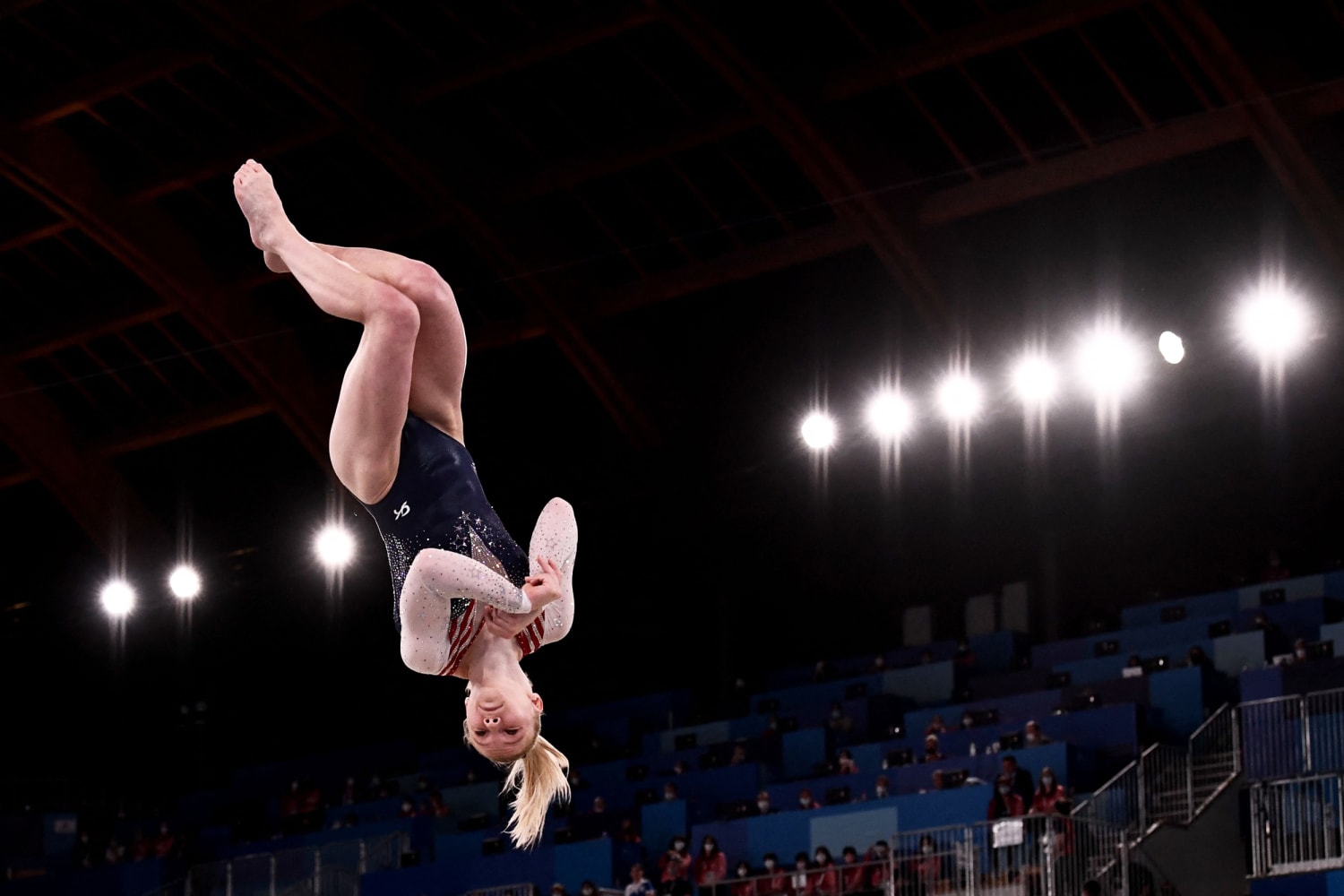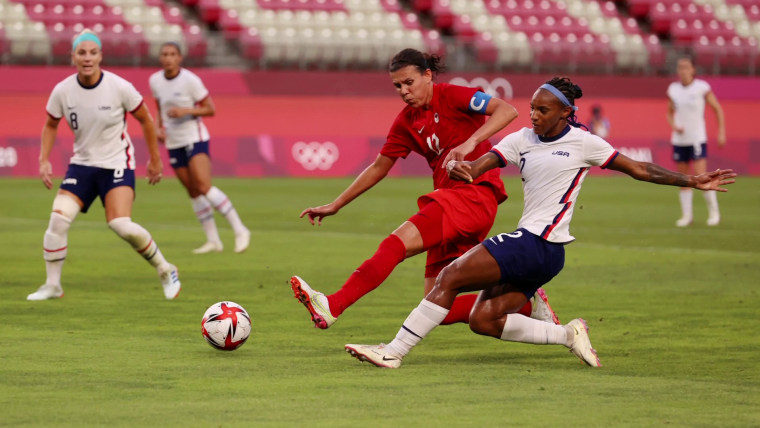Two years ago, when my son was 12 years old, I was driving him and two of his teammates home after their soccer game. They had just won a major tournament and were reveling in the glory of their victory. Crammed into the backseat of my car, the boys were going over plays, goals and who had the best defense. The conversation quickly switched to their favorite players of all time — Neymar, Pele, Messi — and soon they were in a heated discussion over which athletes should be traded and whose team was the best.
I needed to start normalizing women’s sports in our home. That’s why I watched the U.S. women’s soccer team compete in the Olympics with my son sitting on the couch next to me.
Eavesdropping on the conversation, I pulled into the driveway realizing that all their sports role models were men. I turned around to face them and said, “Did you know that in the 2019 Women’s World Cup Final, Megan Rapinoe made history when she scored her 50th international goal on a penalty kick, giving the U.S. the lead in the final?” The boys ignored me and continued talking about their favorite teams — Real Madrid, Barcelona, Leipzig. I tried again. “Did you know that it was the first time in history that a winning team held four World Cups?” Now that I was talking about tangible victories, I briefly had their attention.
The boys knew who Rapinoe was but weren’t really up on her stats, and they quickly went back to talking about male soccer players. It was a moment of reckoning for me. Here I was, an author and journalist covering social justice and equality, and somehow I had dropped the metaphorical soccer ball on teaching my son about the power of female athletes. I thought about clicking the locks on the door shut and giving the boys a speech about equal rights and equal pay.
That moment in the driveway made me realize that there was work to be done, and, as a writer, I had an obligation to do it. I decided to write a book for kids ages 8 to 12 about diverse female athletes who both play at the top of their game and advocate for social justice. I also knew I needed to start normalizing women’s sports in our home. That’s why I watched the U.S. women’s soccer team compete in the Olympics with my son sitting on the couch next to me.
This year’s long-anticipated Tokyo Olympics have been dominated by women. And even though the U.S. women’s soccer team suffered a disappointing loss in the semi-finals Monday, they enjoyed significant attention during their medal bid — and far more than the men’s team, which didn’t even qualify for the games.
Meanwhile, Simone Biles, the most decorated American gymnast in history, commanded headlines leading up the Olympic Games and throughout when she decided not to compete — courageously prioritizing her mental health, and, in the process, signaling to athletes around the globe the importance and value of taking care of ourselves while honoring our bodies. Biles’ teammate Suni Lee stepped in to become the women’s gymnastics all-around champion, continuing the United States’ 17-year winning streak. On Monday, Jade Carey took gold for her floor exercise. And Swimmer Katie Ledecky, the most decorated female swimmer in history, made history yet again when she took the gold in the first-ever women’s 1500-meter freestyle, with her teammate Erica Sullivan claiming the silver.
It would have been amazing if the U.S. women’s soccer team had taken the gold, but that doesn’t matter, and it’s not the point. Female athletes are consistently showing the world just how powerful they are and that they deserve to be treated with the same respect and the same paycheck as their male counterparts. Even though more people than ever are watching women’s sports, with the Olympics a key part of that, they continue to get much less coverage in the media.
According to a USC/Purdue University Study, 95 percent of total television coverage focuses on men’s sports. The same holds true for social media posts and sports newsletters. And the small amount of coverage women’s sports does receive often focuses on appearance rather than their value as athletes. Norway’s beach handball team got attention last month not for their play on the court but for the 150 Euro fine the European Handball Federation gave each player for wearing shorts instead of bikini bottoms during their Olympic faceoff against Spain. The men, by the way, compete in comfortable shorts and shirts.
Just as troubling is the uneven number of females on the field. When my son first started playing soccer at the age of six, there was almost an equal number of boys and girls on his local team. As he got older and the sport became more competitive, fewer girls signed up, and it was much more difficult to recruit them. According to the Women’s Sports Foundation, “By age 14, many girls are dropping out of sports at two times the rate of boys.”
Girls age out of sports for a number of reasons: among them, better coaches gravitate toward the boys’ teams, equipment isn’t equally funded and, often, sports facilities aren’t as good. Back in March, a social media post about the difference between the men’s and women’s weight rooms at the NCAA’s women’s basketball tournament went viral. The men’s weight room was state-of-the-art, while the women’s weight room consisted of one rack of dumb bells and a few yoga mats.
Our culture defaults to men in sports, so we need to retrain ourselves and our children to value all athletes. It’s up to me to teach my future soccer superstar to be an advocate. I want him to understand that as an athlete, it’s his responsibility to speak up when he sees inequality. In 2019, as the FIFA president handed out medals to Team USA, the audience chanted “Equal Pay, Equal Pay.” While the prize money for the men’s team the year before was $400 million dollars, the women were only paid $30 million. I asked my son what he thought of this, and his response was that more people watch men play, so it made sense. This provided an opportunity to acknowledge why more people are watching men’s sports and how that is slowly changing.
While I didn’t understand all the plays in the Olympic women’s soccer matches I watched with my son, and I just recently figured out what off-sides means, that’s not as important as the time we’ve spent together. Sure, my son rolled his eyes at me when I asked him for the 10th time why they were doing a penalty kick, but while he was teaching me the rules of the game, I was teaching him something even more valuable: The meaning of equality, both on and off the field.
A few weeks after the discussion in the car, my son’s team was set to play an older girls’ team. I was impressed with the coaches who made the schedule; it was important for boys to see just how tough girls could be on the field. The final score wasn’t even close. The girls crushed the boys. I know I’m supposed to root for my son’s team, but it was a great lesson. My son took the loss as he would any other. He was upset about it, but admitted that the girls were fierce competitors. Most importantly, when the game started, he didn’t see the opposing team as “just girls,” he saw them as equals, and to me, that was the real win.
Source: | This article originally belongs to Nbcnews.com










